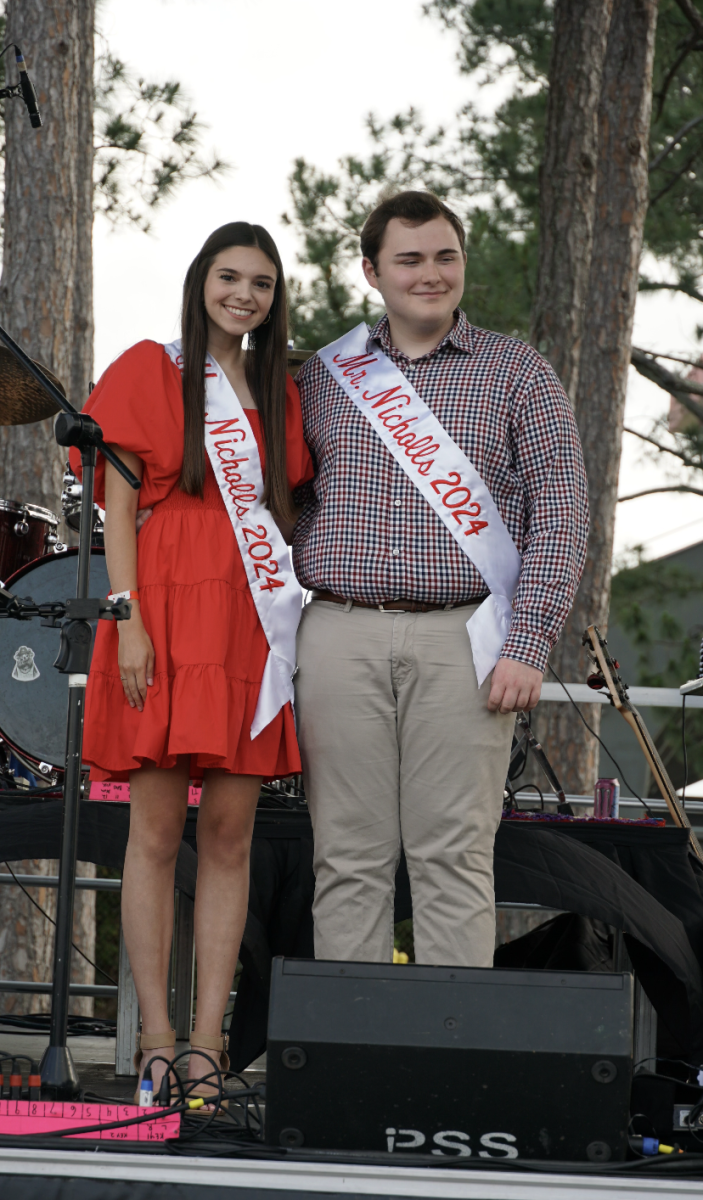Justice John Weimer III’s induction ceremony to the Louisiana Supreme Court nearly two years ago in Talbot Theater was a scene the 49-year-old Thibodaux native could have never conjured up on his own.
Beside him on stage stood four close friends and prominent attorneys he met more than 25 years ago during his college years, family members, a few of his former college instructors and some of his new colleagues he met while working in the judicial system.
“When I saw all those people there who have played such significant roles in my life and continue to play important roles in my life, I was just in awe. It was surreal,” said Weimer, a 1972 Thibodaux High School alumnus.
But what meant more to Weimer than anything else was that the ceremony took place at the same university he graduated from in 1976 with a bachelor’s degree in business administration and a place he taught at for more than 15 years as an associate professor of law.
“To be sworn into the Louisiana Supreme Court on the Nicholls campus, the place I love so much and will always be a part of me, was beyond anything I could have ever imagined in my wildest of dreams,” Weimer, who represents the court’s sixth district, said. “I’m so proud of my alma mater, and I wouldn’t have had it any other way.”
As a Nicholls student, it didn’t take Weimer long to get involved with politics. He was elected freshman class president and became a student senator with the Student Government Association in 1972. As a sophomore, Weimer became the youngest student to date to be elected as SGA president. Weimer held the position until the beginning of his senior year in 1976.
“At that time, the rules were that you had to be at least a junior to be president, but the constitution was amended, and I became eligible,” Weimer said. “To do something like that early in my college career was quite an honor and a great experience.”
Although his time in the SGA has influenced his career tremendously and helped him meet life-long friends, Weimer said his most memorable moments as a student came when he worked in the student media.
Weimer spent a semester as a Nicholls Worth staff cartoonist and the bulk of the same semester as a news editor. He also served another semester as an assistant advertising manager for the student publication before spending a couple semesters as a disc jockey for KDFG (now KNSU), the campus radio station.
“Being in the media gave me the opportunity to meet people I wouldn’t have otherwise met,” Weimer said. “I was able to take bits and pieces of information from different areas of society, and all that information has come together and helped me greatly over the years.”
Weimer graduated as a Nicholls Hall of Fame student in 1976, and the University honored Weimer years later as a Golden Graduate during its 50th anniversary in 1998. Then in 2002, the Nicholls Alumni Federation named Weimer as its James Lynn Powell Award winner, the most prestigious award given to a Nicholls alum.
“Being a student at Nicholls was a special and unforgettable time in my life,” Weimer said. “With almost everything I do today, those experiences play a major role in my decisions.”
Alfred Delahaye, now a professor emeritus of mass communication, became Weimer’s biggest inspiration while he was a student. Weimer said he learned self-discipline and gained valuable writing skills while enduring Delahaye’s technical writing class. Weimer still calls Delahaye today for assistance with writing. “The demands he placed on me as a student are now the same demands I place on myself,” Weimer said. “Those demands have allowed me to gain success.”
After completing his work at Nicholls in 1976, Weimer left for four years to earn a Juris Doctor degree in law at Louisiana State University in 1980. But he would not leave Nicholls for good. In 1982, he returned to the Thibodaux campus as an associate professor of business law.
Among the classes he taught during his tenure were Legal Environmental Business, Commercial Law, Law and Banking and various seminar courses. Most of the classes he taught dealt with law and ethics of the legal system. Weimer also spent some time teaching in the Police Academy.
“The opportunity to touch the lives of students in a positive fashion and in turn have them make a positive impact on me is something many people dream about,” Weimer said. “I always consider my students as friends.”
For his teaching contributions, Weimer was recognized nationally as a Who’s Who among teachers and was awarded the Nicholls Presidential Award for Teaching Excellence from 1982-1997.
It was also during his teaching career when he initially met Penny Hymel Weimer, his wife of 15 years. After injuring his knee during a skiing trip, Weimer hopped on crutches to open a door for Hymel, a student. He was attracted to her, but realized it would be inappropriate to pursue a relationship with a student, but the two met again years later and eventually married.
“She claims that at the first time we met that she knew I was the guy she wanted to get to know and eventually marry,” Weimer said, smiling. “And I wouldn’t doubt it for a minute.”
At that time, however, he was not just teaching. Between 1980 and 1995, Weimer also served as an attorney at his private law firm. Then in 1993, Weimer was grading papers for class when Judge Randolph Parro called Weimer and told Weimer that he had been elected to a higher court.
Parro, having previously served as a judge at the 17th Judicial District Court, Division D, suggested that Weimer submit his name to the Louisiana Supreme Court for the vacant seat. Weimer initially declined, but Perot eventually convinced Weimer to apply. The Louisiana Supreme Court appointed him to the vacant seat almost immediately, and he became judge pro tempore of the district court.
“I was very happy and content teaching law,” Weimer said. “I was a teacher, and I thought there was no way teaching would allow me to become a judge. But before long, I found out how wrong I was. As a teacher, I have to judge a student’s effort. Teaching became the best preparation I could ever have to becoming a judge.”
In 1995 and 1996, he was re-elected as judge of the 17th District Court, Division D, without opposition. He was then elected as judge of the 1st Circuit Court of Appeal, District 1, Division B, in 1998 and served there until he narrowly defeated State District Court Judge Mary Becnel for a vacant spot on the Louisiana Supreme Court in 2001, a seat he will hold for a 10-year term unless he resigns.
“Being involved with law matches the skills that God has blessed me with,” Weimer said. “I enjoy analyzing problems and helping people. Those are attributes I was blessed with. To be able to do those things as a member of the state’s highest court is beyond anything I could have imagined for my life.”
As a justice of the Louisiana Supreme Court, Weimer helps interpret the state’s constitution, review trial appeals from the lower courts and decide whether or not they will hear the case. On average, the Louisiana Supreme Court agrees to accept and hear 10 percent of the more than 3,000 appeals submitted a year. After each case, the judges must issue a full written opinion of the case and why the decision was made.
“The majority of our times goes into reviewing the cases to look at and then writing the opinions of the cases we decide,” Weimer said. “You’re talking about 12-hour days, seven days a week. Sixteen-hour days are not out of the ordinary.”
The state Supreme Court oversees all other state courts and appoints and disciplines its judges. The Supreme Court also sponsors service programs, and it has established various drug treatment courts intended to help those dealing with drug abuse.
Though being a justice on the state’s highest court can be time consuming, Weimer has not forgotten about the importance of education. In May, he spent a week in Adelia Parish teaching special law classes at various schools. Next spring, he will be doing the same in St. Bernard Parish.
Weimer was also part of a special Louisiana Supreme Court hearing at Nicholls in the fall of 2002. The event, held at Talbot Theater, became the most popular court hearing in Louisiana history when more than 600 high school and college students filled the theater. Hundreds more viewed the hearing on televisions around campus.
“The event was designed specifically for educational purposes, and it showed students how the court worked,” Weimer said. “It was especially sweet for me because I was able to showcase my alma mater to the rest of the state. That, in itself, exceeded all I could have ever dreamed of. It was a time you’d never ever want to forget. It was a high point in my life.”
Weimer is also involved in various other organizations. He’s a member of the Nicholls Alumni Board, the Louisiana State Bar Association, the Lafourche Parish Bar Association, the Rotary Club, the Thibodaux Volunteer Fire Department and the Houma-Terrebonne Chamber of Commerce.
But things weren’t always soaring for Weimer. When Weimer graduated from high school, he had no financial assistance to help pay for his college tuition or books. Instead, he spent a summer working offshore to earn funds to pay for higher education.
Things worked out for Weimer though, and he calls holding a position on Louisiana’s highest court a privilege. Despite his success, Weimer humbly refuses to take the credit himself. Weimer said he would not have gotten as far in life as he has without his alma mater.
“Nicholls is the very epicenter for my success,” Weimer said. “Without such a great University filled with talented and dedicated students, faculty and staff who pushed me and challenged me to do the best I can, I would not be where I am today.”


![Assistant coach Cody Livingston [#53] talking with pitcher Nico Saltaformaggio [#38] on the mound(5/12).](https://thenichollsworth.com/wp-content/uploads/2024/05/LivingstonNicoHuddle-vs-Lamar-1200x800.jpg)




